Mingzhe Zhang
CipherPrune: Efficient and Scalable Private Transformer Inference
Feb 24, 2025

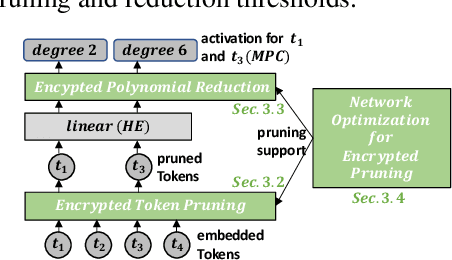

Abstract:Private Transformer inference using cryptographic protocols offers promising solutions for privacy-preserving machine learning; however, it still faces significant runtime overhead (efficiency issues) and challenges in handling long-token inputs (scalability issues). We observe that the Transformer's operational complexity scales quadratically with the number of input tokens, making it essential to reduce the input token length. Notably, each token varies in importance, and many inputs contain redundant tokens. Additionally, prior private inference methods that rely on high-degree polynomial approximations for non-linear activations are computationally expensive. Therefore, reducing the polynomial degree for less important tokens can significantly accelerate private inference. Building on these observations, we propose \textit{CipherPrune}, an efficient and scalable private inference framework that includes a secure encrypted token pruning protocol, a polynomial reduction protocol, and corresponding Transformer network optimizations. At the protocol level, encrypted token pruning adaptively removes unimportant tokens from encrypted inputs in a progressive, layer-wise manner. Additionally, encrypted polynomial reduction assigns lower-degree polynomials to less important tokens after pruning, enhancing efficiency without decryption. At the network level, we introduce protocol-aware network optimization via a gradient-based search to maximize pruning thresholds and polynomial reduction conditions while maintaining the desired accuracy. Our experiments demonstrate that CipherPrune reduces the execution overhead of private Transformer inference by approximately $6.1\times$ for 128-token inputs and $10.6\times$ for 512-token inputs, compared to previous methods, with only a marginal drop in accuracy. The code is publicly available at https://github.com/UCF-Lou-Lab-PET/cipher-prune-inference.
CoralSCOP-LAT: Labeling and Analyzing Tool for Coral Reef Images with Dense Mask
Oct 27, 2024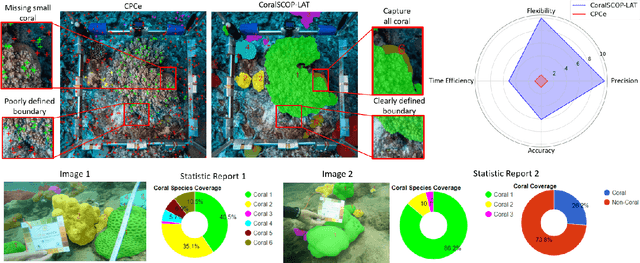
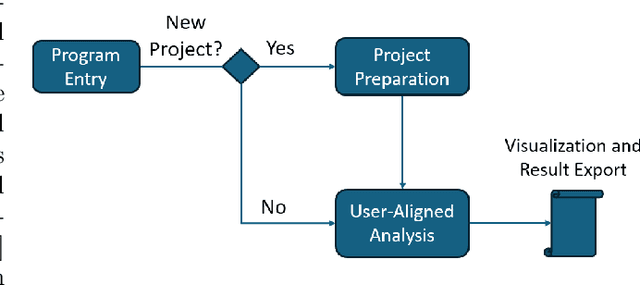
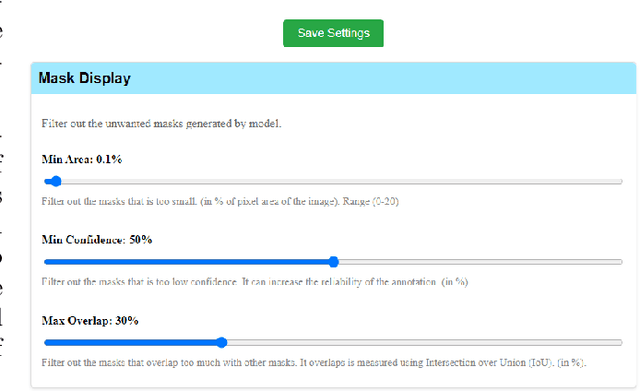
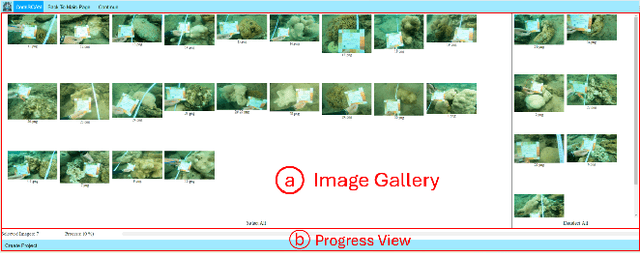
Abstract:Images of coral reefs provide invaluable information, which is essentially critical for surveying and monitoring the coral reef ecosystems. Robust and precise identification of coral reef regions within surveying imagery is paramount for assessing coral coverage, spatial distribution, and other statistical analyses. However, existing coral reef analytical approaches mainly focus on sparse points sampled from the whole imagery, which are highly subject to the sampling density and cannot accurately express the coral ambulance. Meanwhile, the analysis is both time-consuming and labor-intensive, and it is also limited to coral biologists. In this work, we propose CoralSCOP-LAT, an automatic and semi-automatic coral reef labeling and analysis tool, specially designed to segment coral reef regions (dense pixel masks) in coral reef images, significantly promoting analysis proficiency and accuracy. CoralSCOP-LAT leverages the advanced coral reef foundation model to accurately delineate coral regions, supporting dense coral reef analysis and reducing the dependency on manual annotation. The proposed CoralSCOP-LAT surpasses the existing tools by a large margin from analysis efficiency, accuracy, and flexibility. We perform comprehensive evaluations from various perspectives and the comparison demonstrates that CoralSCOP-LAT not only accelerates the coral reef analysis but also improves accuracy in coral segmentation and analysis. Our CoralSCOP-LAT, as the first dense coral reef analysis tool in the market, facilitates repeated large-scale coral reef monitoring analysis, contributing to more informed conservation efforts and sustainable management of coral reef ecosystems. Our tool will be available at https://coralscop.hkustvgd.com/.
A Boosting Algorithm for Positive-Unlabeled Learning
May 19, 2022
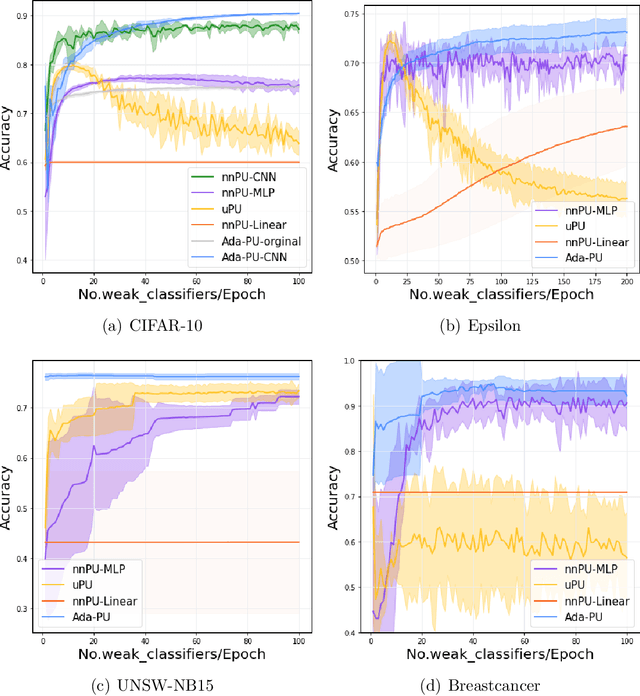

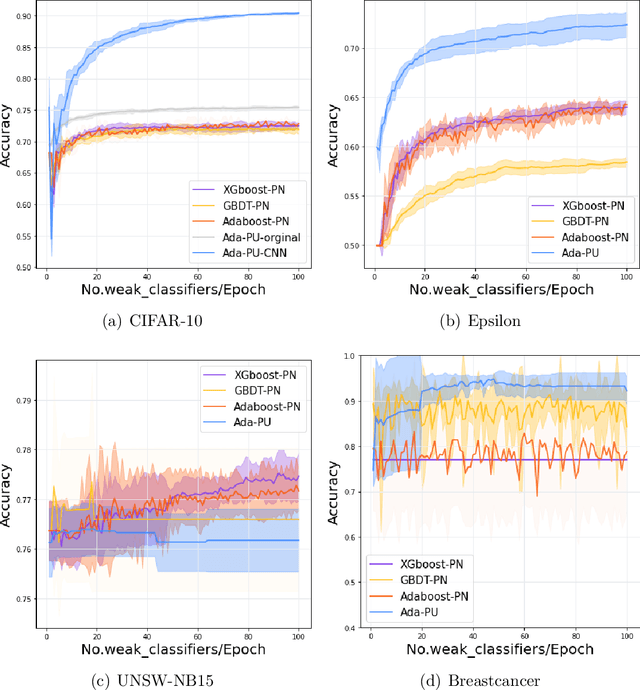
Abstract:Positive-unlabeled (PU) learning deals with binary classification problems when only positive (P) and unlabeled (U) data are available. A lot of PU methods based on linear models and neural networks have been proposed; however, there still lacks study on how the theoretically sound boosting-style algorithms could work with P and U data. Considering that in some scenarios when neural networks cannot perform as good as boosting algorithms even with fully-supervised data, we propose a novel boosting algorithm for PU learning: Ada-PU, which compares against neural networks. Ada-PU follows the general procedure of AdaBoost while two different distributions of P data are maintained and updated. After a weak classifier is learned on the newly updated distribution, the corresponding combining weight for the final ensemble is estimated using only PU data. We demonstrated that with a smaller set of base classifiers, the proposed method is guaranteed to keep the theoretical properties of boosting algorithm. In experiments, we showed that Ada-PU outperforms neural networks on benchmark PU datasets. We also study a real-world dataset UNSW-NB15 in cyber security and demonstrated that Ada-PU has superior performance for malicious activities detection.
 Add to Chrome
Add to Chrome Add to Firefox
Add to Firefox Add to Edge
Add to Edge